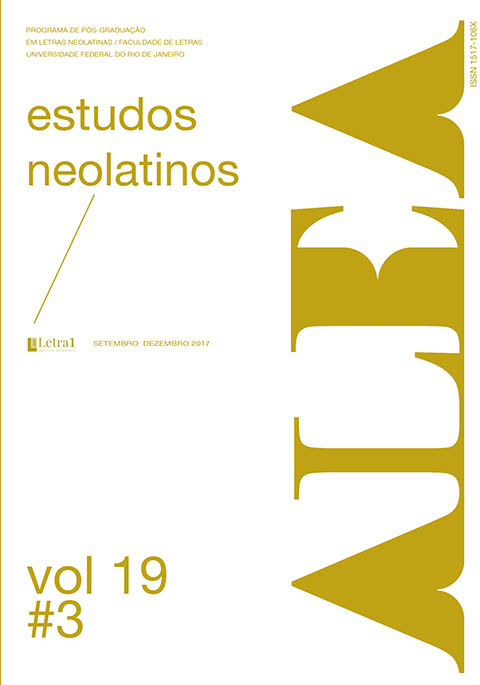Borges contra Borges: más traduções de “O Aleph”
DOI:
https://doi.org/10.1590/1517-106X/2017193479493Abstract
Borges parece haver argumentado que as traduções são frequentemente melhores do que os originais, mas ele próprio fez um grande esforço (por exemplo, aprender alemão, em sua juventude, para ler Kafka) para acessar a literatura em suas línguas originais. Em sua maturidade, fez um grande esforço para aprender o idioma nórdico das sagas para lê-las diretamente. Sua saída foi acatada de maneira literal demais pela crítica e, pior, por seus próprios tradutores, que foram descuidados na tradução de seus relatos, mostrando uma liberdade que compromete seus próprios textos. Este ensaio examina três traduções de “O Aleph”, ao inglês, francês e italiano, para demonstrar como Borges foi mal traduzido de maneira que afeta a correta leitura de seus textos. As equivocadas traduções são de uma palavra-chave para referir-se a um baú que o protagonista encontra em um porão, e que é uma espécie de representação correlativa do Aleph. A partir desses equívocos de tradução, o ensaio propõe uma interpretação do relato.
References
AGUSTÍN, San. Obras de San Agustín, Ed. Ángel Custodio de la Vega. Vol. II. Madrid: Biblioteca de Autores Cristianos, 1968.
BENJAMIN, Walter. fte Task of the Translator. In: Illuminations, edited with an introduction by Hannah Arendt, translated by Harry Zohn. Nueva York: Schocken Books, 1969, p. 69-82.
BLOCH, R. Howard. One Toss of the Dice: The Incredible Story of How a Poem Made us Modern. New York: Norton, 2016.
BORGES, Jorge Luis. Las versiones homéricas. In: Obras completas. Buenos Aires: Emecé, 1974, p. 239-43.
BORGES, Jorge Luis. El Aleph. In: Obras completas, Buenos Aires: Emecé, 1974, p. 617-30.
BORGES, Jorge Luis. fte Aleph. In: A Personal Anthology. Edited with a Foreword by Anthony Kerrigan. New York: Grove Press, 1967.
BORGES, Jorge Luis. fte Aleph. In: The Aleph and Other Stories 1933-1969. Together with Commentaries and an Autobiographical Essay. Edited and translated by Norman ftomas di Giovanni in collaboration with the author. New York: Dutton, 1970.
BORGES, Jorge Luis. fte Aleph. In: Collected Fictions, translated by Andrew Hurley. New York: Viking, 1998.
BORGES, Jorge Luis. L'Aleph. In: L'Aleph. Traduit par Rober Caillois. París: Gallimard, 1967.
BORGES, Jorge Luis. L'Aleph. In: L'Aleph. Trans. Francesco Tentori Montalto. Milán: Feltrinelli, 1959, p. 205-25.
DE MAN, Paul. Blindness and Insight: Essays in the Rhetoric of Contemporary Criticism. Nueva York: Oxford University Press, 1971.
DE MAN, Paul. Conclusions: Walter Benjamin's ‘fte Task of the Translator. In: The Resistance to Theory. Foreword by Wlad Godzich. Minneapolis: University of Minnesota Press, 1986, p. 73-105.
GONZÁLEZ ECHEVARRÍA, Roberto. Myth and Archive: A Theory of Latin American Narrative. Cambridge: Cambridge University Press, 1990. [Mito y archivo: una teoría de la narrativa latinoamericana. Mexico: Fondo de Cultura Económica, 2000; nueva edición 2011].
GONZÁLEZ ECHEVARRÍA, Roberto. fte Aleph. In: Cambridge Companion to Jorge Luis Borges. Edited by Edwin Williamson. Cambridge, UK: Cambridge University Press, 2013, p. 123-36.
KRISTAL, Efraín. Invisible work: Borges and translation. Nashville: Vanderbilt University Press, 2002.
RODRÍGUEZ MONEGAL, Emir. Borges and La nouvelle critique. In: Diacritics, Summer 1972, p. 27-34.
RODRÍGUEZ MONEGAL, Emir. Jorge Luis Borges: A Literary Biography. New York: Dutton, 1978.
SPITZER, Leo. La enumeración caótica en la poesía moderna. In: Lingüística e historia literaria, 2a. ed. Traducción de Raimundo Lida. Madrid: Gredos, 1961, p. 247-300.
WILLIAMSON, Edwin. Borges: A Life. New York: Viking, 2004.
Downloads
Published
Issue
Section
License
THE AUTHOR/S confirm/s his, her or their participation in all stages of work preparation: 1) Conception, project, bibliographical research, analysis and interpretation of data; 2) Writing and reviewing the manuscript; 3) Approval of the final version of the manuscript for publication; 4) Responsibility for all aspects of the work and guarantee for the accuracy and integrity of any part of the work. The submission of works implies the immediate cession, without onus, by all authors, of publication rights to the journal Alea, licensed under CC BY (https://creativecommons.org/licenses/by/4.0/). The authors are fully responsible for the content of the article and continue to hold all copyrights for subsequent publications of it, and should, if possible, include the reference to the first publication in the journal. Alea does not commit to returning received contributions. Authors of articles, reviews or translations will receive a copy of the journal.

